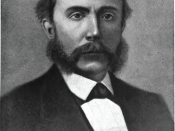According to Webster , to have a monopoly is to have exclusive ownership, possession, or control. The following essay is an examination of Microsoft in comparison to this definition and another commonly known monopoly, Standard Oil. Also attention will be given to the necessary role of and problems with monopolies.
Competitive Market vs. Monopoly
A competitive market consists of many buyers and sellers. Markets thrive because an equilibrium price is established through natural competition and no single buyer or seller can affect that price. Instead both buyer and seller must take the price given by the market based on the dynamics of supply and demand. This competition is healthy and necessary to the economy because it regulates price, production, promotes and motivates innovation and improvement. In comparison, a monopoly dictates its price and quantity based on demand. It has the potential to influence prices and does so to increase profits.
Regarding production, a monopolist produces below the demand curve in order to charge higher prices to consumers. Less production and higher prices clearly illustrate the inefficiency of a monopoly and the harm it may cause to the economy.
The Sherman Anti-Trust Act of 1890
In order to prevent a handful of monopolies and trusts (another form of monopolization) from controlling the economy, Congress passed the Sherman Anti-Trust Act of 1890. Signed into law by President Benjamin Harrison on July 2, 1890, the law consists of two sections.
Section 1 primarily prohibits any contract or action whose aim is an unreasonable restrain on trade or commerce. Violates of Section 2 result from misuse or abuse of market power in order to gain or maintain a monopoly. Such actions generally target existing competition or prevent the rise of future competitors. Some examples of such actions are refusal to sell to a...


